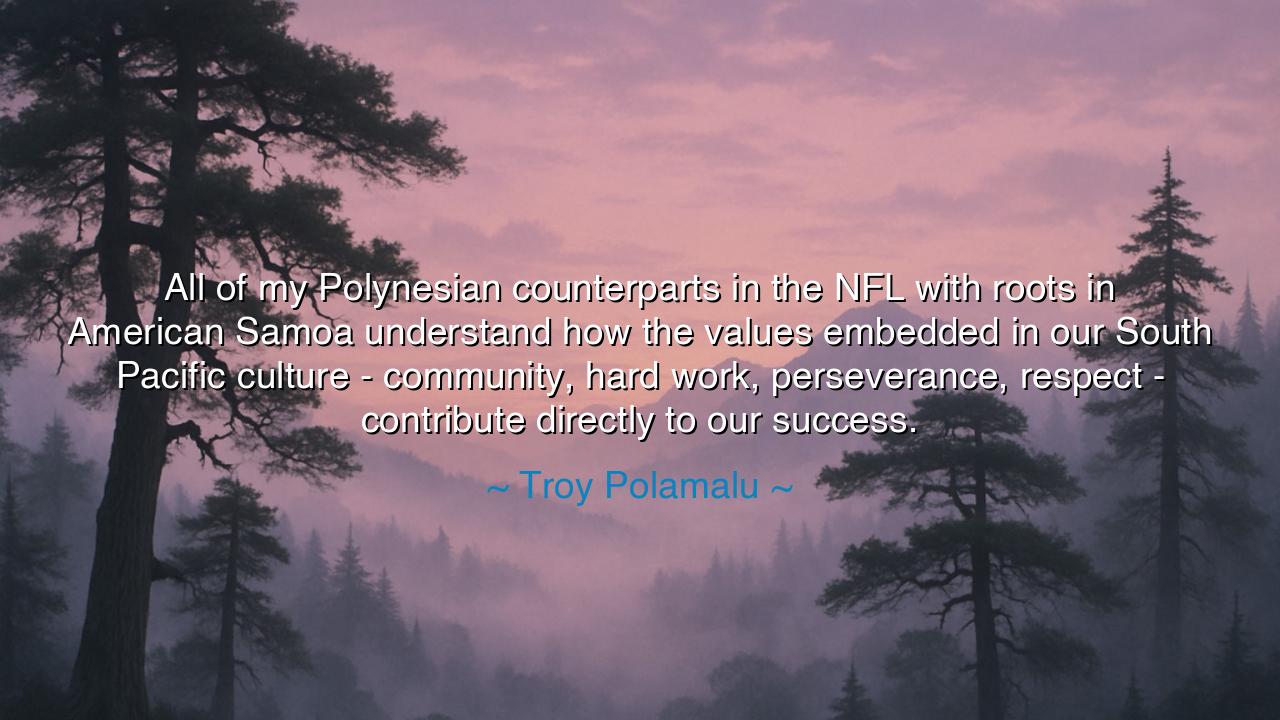
All of my Polynesian counterparts in the NFL with roots in
All of my Polynesian counterparts in the NFL with roots in American Samoa understand how the values embedded in our South Pacific culture - community, hard work, perseverance, respect - contribute directly to our success.






In the voice of Troy Polamalu we hear a testament to heritage and strength: “All of my Polynesian counterparts in the NFL with roots in American Samoa understand how the values embedded in our South Pacific culture—community, hard work, perseverance, respect—contribute directly to our success.” His words are more than remembrance; they are a song of lineage, a reminder that greatness is not born of chance, but of the deep currents of tradition that flow through a people.
The soil of American Samoa has given rise to many warriors of the gridiron, men whose bodies are strong and whose spirits are fortified by the teachings of their ancestors. In the islands of the Pacific, where life is bound to sea and sky, children grow up in the embrace of community. They learn early that no one stands alone—that every hand must serve the other, every voice must be raised for the whole. This is no small thing, for on the field of battle, as on the field of sport, the unity of brothers determines the victory of all.
Polamalu speaks also of hard work, the timeless virtue carved into the hands of fishermen, builders, and farmers who labored under sun and storm. In Polynesian life, one learns that strength is not a gift but a duty, to be honed daily through sweat and persistence. This discipline flows naturally into football, where endless drills and relentless training demand a spirit forged in endurance. The success of Polynesian players in the NFL is not an accident—it is the harvest of centuries of toil, passed down through the marrow of generations.
To these is added perseverance, the unyielding spirit that refuses to bow before adversity. Islanders have weathered cyclones, faced scarcity, and endured separation across vast oceans. This resilience is not erased by time but carried forward, manifesting in athletes who rise again after every fall, who keep pressing forward even when defeat seems near. Such perseverance becomes the silent engine of victory, the unseen strength that lifts a man when his body is weary but his heart still burns.
Above all, Polamalu honors respect, the crown of all virtues in Polynesian culture. Respect for elders, for family, for opponents, for the game itself. It is this reverence that keeps pride from rotting into arrogance, that allows strength to remain noble rather than destructive. In football, as in life, respect binds the warrior’s heart to a higher purpose—it makes the contest not merely about glory, but about honor.
History offers us many mirrors of this truth. Consider the Spartans of ancient Greece, who from youth were trained in discipline, unity, and reverence for their people. Their strength in battle was not only in their arms but in the values that bound them together. So too with the Polynesian athletes: their greatness is not merely of muscle, but of culture, carried within them like a sacred fire. Polamalu himself, with his quiet humility and ferocious play, stands as living proof of these ancestral gifts.
The lesson for us is clear: success without values is hollow, but success rooted in community, hard work, perseverance, and respect endures beyond the game, beyond the applause. Whether in sport, in labor, or in daily life, we too must draw upon the values of our heritage, whatever they may be, and let them guide us toward purpose. Seek your community, honor your work, endure through hardship, and show respect to all. In these virtues lies the true measure of greatness.
Thus, Polamalu’s words rise beyond the stadium. They remind us that triumph is not the child of talent alone, but of tradition, of culture, of the unseen hands of ancestors. To remember this is to live not as isolated individuals, but as carriers of a lineage, warriors of a greater story. And in doing so, we become not only successful, but worthy of the victory we attain.






AAdministratorAdministrator
Welcome, honored guests. Please leave a comment, we will respond soon